1. ‘Elfin’ Creeping Thyme
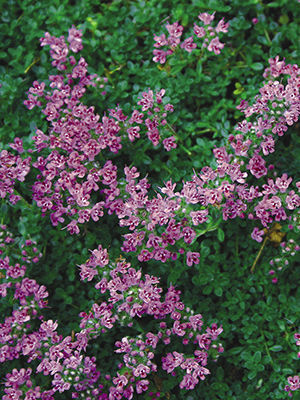
Name: Thymus serpyllum ‘Elfin’
USDA hardiness zones: 4 to 9
Size: 1 to 2 inches tall and 4 to 8 inches wide
Conditions: Full sun; well-drained soil
The aromatic evergreen foliage of ‘Elfin’ creeping thyme is handsome in every season. Along a pathway, the dense mat of tightly packed leaves can artistically outline the spaces between stepping-stones, but the plant works equally well cascading over a rock wall. I look forward to the few weeks in summer when ‘Elfin’ covers itself with miniature flowers. This thyme can withstand fairly heavy foot traffic.
2. ‘Black Scallop’ Bugleweed
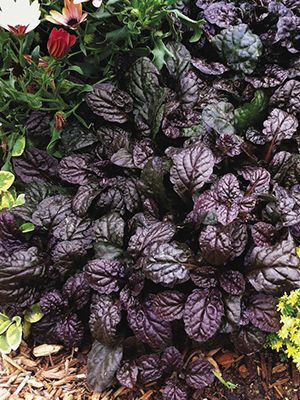
Name: Ajuga reptans ‘Black Scallop’
Zones: 3 to 9
Size: 3 to 6 inches tall and 3 feet (or more) wide
Conditions: Full sun to partial shade; well-drained soil
The stunning glossy foliage of ‘Black Scallop’ bugleweed is so dark that it appears almost black, even though it’s really a dark purple. This is one of my favorite companion perennials because, when used under taller plants, the dark foliage complements almost everything. To keep this creeper from overstepping its bounds during its annual spring leap, I snip back its rambunctious runners.
3. Blue Star Creeper
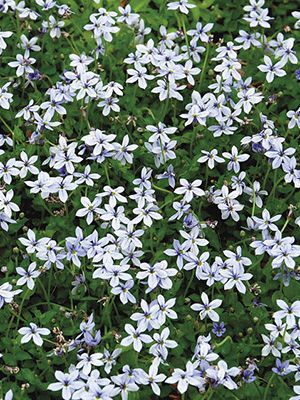
Name: Isotoma fluviatilis
Zones: 5 to 9
Size: 2 inches tall, spreading indefinitely
Conditions: Full sun to partial shade; moist, well-drained soil
It’s hard for me to decide on my favorite plant for a flagstone path, but one plant that consistently rises to the top is the charming blue star creeper. This tiny-leaved semievergreen plant sparkles with star-shaped, sky blue flowers from late spring into summer. The plant slows down after its initial flush of flowers and blooms sporadically until fall. You’ll want to site this tiny perennial away from small delicate plants and give it room to roam because it can swallow some neighbors if left unchecked.
4. Alpine Water Fern
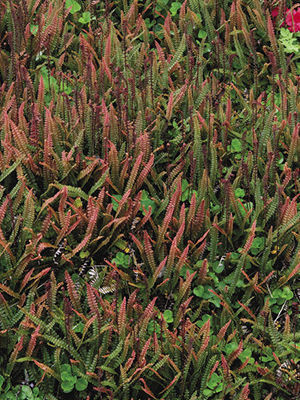
Name: Blechnum penna-marina
Zones: 7 to 10
Size: 6 inches tall and 5 feet wide
Conditions: Partial shade; moist, acidic, well-drained soil
The favored position of this creeping evergreen fern is in a moist spot with adequate drainage. Native to the Southern Hemisphere, where it grows in alpine regions at 3,000 feet, alpine water fern thrives equally well in gardens at sea level. The new growth unfurls in warm coppery hues, which light up a shady corner before the fronds mature to green. This new spring growth complements the soft greens of the newly emerging foliage of western sword fern (Polystichum munitum, Zones 3–8).
Debbie Teashon owns the regional gardening website rainyside.com.
Photos:#1 and #4, courtesy of Debbie Teashon; #2, Steve Aitken; #3, courtesy of greatgardenplants.com





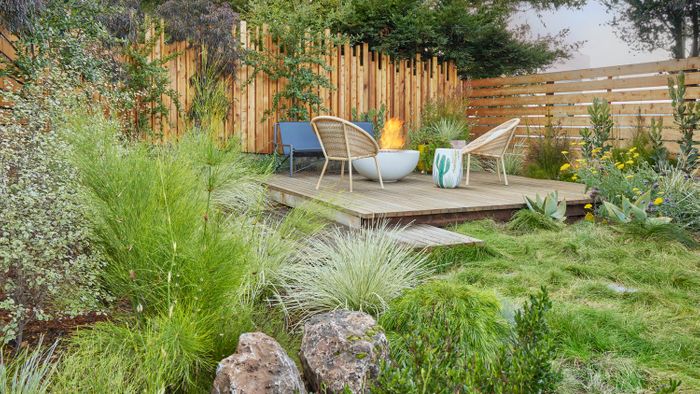

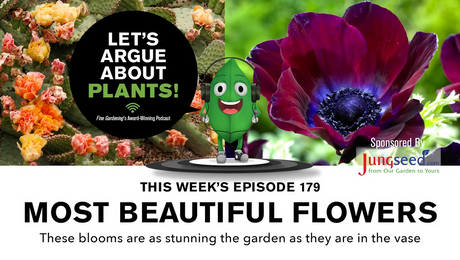










Comments
Log in or create an account to post a comment.
Sign up Log in